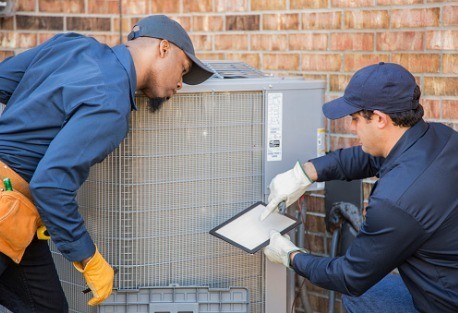Learn More About Your HVAC System
When you come face to face with a cooling or heating system problem, you may feel overwhelmed when it comes to technical AC terms common in the industry. However, when your system is in need of some AC repairs, it can help to have a basic understanding of these terms. The experienced technicians at our HVAC company have put together a guide of standard terms you should know.
Need help deciding which home system is the right one for your home? Contact Gordon’s Heating & Air today to schedule an appointment or learn more about our wide range of HVAC services, including AC maintenance, AC installation, and more! Don’t forget to join our Comfort Club for even more benefits!

SEER Rating
SEER, or seasonal energy efficiency ratio, is the ratio of the system’s total cooling output divided by the total energy input over the span of a season. This is used to measure how efficient your air conditioning unit is, as the higher the unit is rated, the more energy-efficient it is. If you are considering upgrading your air conditioner, the SEER rating is an essential factor to consider during your search.
Annual Fuel Utilization Efficiency
Your air conditioner’s annual fuel utilization efficiency (AFUE) is used to measure the efficiency of your home’s furnace, boiler, and water heater. Measured in percentages, a high AFUE percentage means the system transfers a more significant amount of energy input into energy production. It is natural to see the rating decrease over time, but if the AFUE rating has dipped below 80% efficiency, it may be time to consider a more energy-efficient replacement.
Ductwork
Your home’s ductwork is a network of metal pipes that extend from the air conditioning throughout your home. They are a part of your HVAC system and help evenly spread warm and cold air through the entire home, rather than just a couple of rooms. Depending on where you live, a ductless HVAC system can be a more efficient option.
Evaporator Coil
An evaporator coil is located inside the air conditioner or attached to your home’s furnace and absorbs heat from inside the home. As air passes over the coil, it removes the heat, which causes moisture to condense and dehumidify the home’s interior air. It works together with the HVAC’s condenser coil to complete the unit’s heat exchange process.
Condenser Coil
In tandem with the evaporator coil, the condenser coil works to remove heat from the system. Condenser coils are made up of copper and hold the refrigerant in its liquid form. Usually located in your outdoor air conditioning unit or your heat pump unit, the coils work to release the heat collected by the evaporator coils and disperses this heat into the outdoors. For proper airflow, we recommend leaving a 2-foot clearance around the outdoor unit.
MERV Rating
A minimum efficiency reporting value, or MERV rating, is based on a 1–16 scale used to measure how effective air filters are at removing airborne particles. A MERV rating is used to show the worst-case performance of an air filter when dealing with potentially harmful air particles.
Indoor Air Quality
Your home’s indoor air quality is a measure of how clean the air is inside your home, and poor indoor air quality can lead to some significant health consequences, including respiratory disease, heart disease, and cancer. To help remedy this problem, we recommend regularly cleaning, opening the windows, changing your air filters, and conducting regular HVAC maintenance.